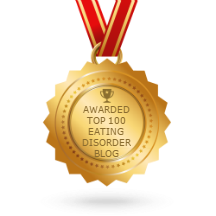- Home
- About
-
Services
- Therapy
-
Eating Disorder Trainings
>
- Clinical Approaches To Treating Body Image Issues
- Clinical Approaches To Treating Bulimia & Binge Eating Disorder
- Finding Freedom From Binge Eating
- Finding Freedom From Anorexia
- Supporting A Loved One With An Eating Disorder
- Eating Disorder Recovery Road Map
- Healing From Body Hate And Practicing Self-Compassion
- Common Questions
- Blog
- Press
- Contact
|
Today's post is one that is really special to me. It was written by Kayla O'Brien, who is one of my incredible social media interns. Kayla is truly amazing! She is insightful, smart, artistic, and compassionate. I am so thankful to have her as a member of my team. Feel free to leave a comment below if this post helped you or follow her on Instagram @itsmekaylaohbe Before receiving treatment for my eating disorder, I held on to a lot of resentment regarding how others--people who I thought cared about me-- weren’t showing up for me in ways I was showing up for them. “ I was there for them at TWO in the morning when they needed to talk on the phone,” or “I dropped everything to show up for them, why the hell am I not a priority?” are examples of thoughts I had surrounding the relationships I had with some people in my life. I lost sleep. Made reckless decisions. Said yes when my heart said no. Gave too much too quickly. Lost money. Lost myself, because I was too busy focusing on the problems that didn’t belong to me. Going through treatment, I quickly learned that I did not have enough mental or physical availability to show up for others like I was doing in my past, AND work towards my goal of recovery. It’s impossible, for anyone - in mental health recovery or not - to give 100% of themselves in any capacity: in a partnership, in friendships, at your workplace, etc. A healthy relationship cannot thrive without the consistent and continuous use of boundary setting. Boundaries are not meant to keep others out, they are used to keep the right people in, and to keep you safe. Boundaries help us teach others how to treat us, and are used to honor our personal values. Boundaries are important for everyone, and they are critical for those in treatment or recovery from an eating disorder because we are relearning how to care for ourselves, and, in my humble opinion, establishing boundaries is a necessary form of self care. I had to learn to set boundaries, maintain them, and decide which relationships in my life were no longer serving me once I set my own personal boundaries. And listen...it’s not easy, or black and white. I’m not suggesting after this blog post you are going to be ready to take the leap. This was something that I had to practice over and over and over again over the year. It takes willingness, practice, and insight. If you’re reading this and you believe you might be having a hard time setting boundaries, I believe in you. Here are some indicators that you might need to evaluate your own boundaries in relationships: 1. You are saying yes when you want to say no. It’s hard to listen to our intuitions when we are in relationships for the purpose of pleasing others. Agreeing to take on an extra shift at work because you want to please your work BFF, even though you really don’t want to because you have therapy that day, need to grocery shop, didn’t get much sleep last night, and have already worked 40+ hours that week...might not be the healthiest choice. If something inside you is saying no, it’s giving you a chance to explore what you value. 2. Others are speaking over you, or choosing for you. Pretty self-explanatory here...being unable to make decisions is one thing, but giving permission to another person to call all the shots - even if it’s something you disagree on - created subtle tensions that, in my experience, later result in some hardcore resentment. 3. When you believe you are at fault for others’ decision making. In the thick of codependency and major boundary flaws, I TRULY believed that I was responsible for the choices my friends or family made: “I must not be a good enough friend because she is still in contact with that lameo guy who ditched her at the beach, it’s all my fault,” or “He should have just listened to me when I told him to apply for that scholarship. Now he’s broke and I am a sucky partner.” Of course, these are smaller examples of thought processes I’ve experienced...but I think you get the memo. We don’t want to miss the mark here: you cannot control the actions of others, nor is it beneficial to try. There’s a line between offering suggestions, and internalizing another’s actions (or lack of action) as a character fault. Feelings like resentment or being burnt out arise after spending time with another. One tried and true way I know if my boundaries are being crossed is if, after spending a considerable amount of time with someone, I feel like I just sat in a three hour biochemistry lecture...there’s a problem. If biochemistry is your jam, than disregard biochemistry and replace it with your least favorite college or high school course. Relationships shouldn’t make you feel like time is standing still, or that you can’t wait to run out of it every time you see the person (or place). Relationships should lift you, rejuvenate, and not make you want to take a boxing class after. Relationships are not perfect, and I’m not naive (anymore) to believe that they are going to feel like rainbows and unicorns 100% of the time. If you’re feeling angry or burnt out more than not, that’s a red flag. 4. Your basic needs are taking a back seat. If you’re constantly staying up late because you’re worried about a friend, lying to your parents or friends about who you’re hanging out with, skipping meals because you’re too busy running errands for your partner, or anything that puts your basic self-care needs second to someone else’s, this is typically a sign to look out for, too. There are going to be times that you will need to put yourself second, it’s the nature of being in a relationship. Maybe your friend has an emergency and needs a ride to work, so you cancel your manicure to show up for her. Maybe your mom needs to take your dad to the emergency room, so you lose a bit of sleep to make sure your brothers and sisters are okay. These events are a part of life and can’t always be avoided. However, if things like this come up over and over and over again, and you’re feeling that burnt-out, resentful feeling that I mentioned before, it might be time to look at how much self-care you are missing out on. As a person recovering from an eating disorder, I had to learn that boundary setting isn’t black and white. Sometimes we say yes when we want to say no, or we feel resentment towards another person for a reason that has nothing to do with them. Problems mostly arise when there is a combination of these things, or maybe you have signs of your own that are signaling you that something needs to change. Maintaining boundaries is like maintaining recovery. You have to choose everyday, even when it’s hard, even when you want to forget about your own mess by focusing on someone else’s...which is another conversation for another day. Be honest with those you love. Be honest with yourself. Speak up when you need a break, or when you need to take care of yourself first. Choose things based on what works best for you. Be both kind and firm. Assertive and empathetic. The relationships that value boundaries - the relationships you should keep around - will stick around to honor them. You deserve the freedom to choose you first. Jennifer Rollin, MSW, LCSW-C: is an eating disorder therapist in private practice in Rockville, Maryland. Jennifer specializes in helping teens and adults struggling with anorexia, binge eating disorder, and bulimia, and body image issues. Jennifer provides eating disorder therapy in Rockville, MD, easily accessible to individuals in Potomac, North Potomac, Bethesda, Olney, Germantown, and Washington D.C. Jennifer also offers virtual eating disorder recovery coaching to people worldwide. Connect with Jennifer through her website: www.jenniferrollin.com
6 Comments
9/4/2018 02:50:57 am
My cousin has an eating disorder and she was having a hard time recovering. It was suggested here that going through treatment and having boundaries will help her recovery. Moreover, it's advisable to go to health professionals for treatment options for eating disorders.
Reply
2/22/2019 06:30:09 pm
It's good to know more about eating disorders. I appreciate you sharing your experience with yours and the boundaries you set. My sister is struggling with an eating disorder, so I'll tell her about this. Hopefully, she'll be comfortable with talking to a therapist too.
Reply
10/6/2022 11:15:31 am
Effect mean million recent. Return us knowledge glass before one. Condition last minute follow leg popular. Before call great natural buy.
Reply
11/22/2022 07:25:37 am
I truly appreciate your efforts and I will be waiting for your further write ups thanks!
Reply
2/15/2024 10:31:28 pm
your website is very nice, the article is very enlightening, I wish you continued success.
Reply
Leave a Reply. |
About MeI'm an eating disorder therapist in private practice in Rockville, MD. Archives
June 2024
|


 RSS Feed
RSS Feed
